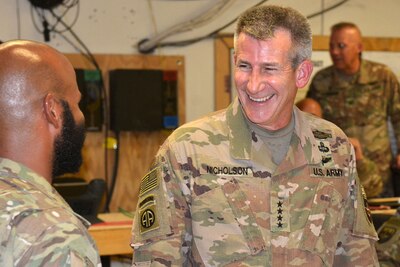
WASHINGTON —
The peace process in Afghanistan has shown progress since the first cease-fire in 17 years took place in June, the commander of NATO’s Resolute Support mission and U.S. forces in Afghanistan told Pentagon reporters today.
Speaking from Afghanistan via teleconference Army Gen. John W. Nicholson called the response to the cease-fire overwhelming. “For the first time in 17 years, the Afghan people, the Afghan security forces and the Taliban all celebrated Eid al-Fitr together in peace,” he said, referring to the Muslim holiday that marks the end of the monthlong Ramadan fast.
The first cease-fire unleashed the Afghan people’s desire for peace and an end to violence on a national and unprecedented scale, the general added. “And numerous groups across Afghanistan — the People’s Peace Movement, religious [scholars], civil society, youth activists, women’s groups — are all calling for peace,” he said.
Nicholson emphasized that any negotiations over the political future of Afghanistan will be between the Taliban and the Afghan government.
“This must be an Afghan-led, Afghan-owned peace process, with Afghans talking to Afghans. And the U.S. is prepared to support, facilitate and participate in these discussions,” Nicholson told reporters.
Taliban Progression
Officials also have seen a clear progression in the Taliban’s public statements, including a Feb. 14 letter letter to the American people and the group’s recent message marking the Eid al-Adha religious holiday, in which Taliban Emir Hibatullah Akhundzada acknowledged for the first time that negotiations will ensure an end to the war, the general said.
There is an unprecedented opportunity for peace right now, and Afghan President Ashraf Ghani is working to take advantage of it,” Nicholson said. “He offered a second cease-fire on Aug. 19,” he added, “and while this first cease-fire was in response to the [body of religious scholars’] call for peace, this second call represents the entirety of Afghan society.”
The general told reporters that Ghani said the cease-fire potentially could last till Nov. 20, the birthday of the prophet Mohammad.
“However, the cease-fire will only occur if the Taliban reciprocate, and only for as long as the Taliban participate in the cease-fire,” Nicholson said. “And so far, we have not heard if the Taliban will accept or reject the cease-fire, and we’re prepared for either case. And like the first cease-fire, this only applies to the Taliban. Our other counterterrorism operations will continue.”
Fighting and Talking
Therefore, he noted, forces are fighting and talking.
“The Taliban are fighting … to increase their leverage in the negotiation and to maintain their cohesion,” the general said. “Now, militarily speaking, they made two attempts this year to seize provincial capitals. They both have failed. In 2016, you remember, there were eight attempts to seize provincial capitals.”
Such attacks in cities bring great hardship on the Afghan people, Nicholson said, adding that the Taliban repeatedly claim not to cause civilian casualties, but “their actions show otherwise.”
The general, who is retiring soon, acknowledged the courage of the Afghan security forces and the Afghan people who fight terrorism every day. “[They] do this on our behalf for the entire world,” he said. “It’s been an honor to serve alongside them for six years, and I thank them for their hospitality.”
(Follow Terri Moon Cronk on Twitter: @MoonCronkDoD)



